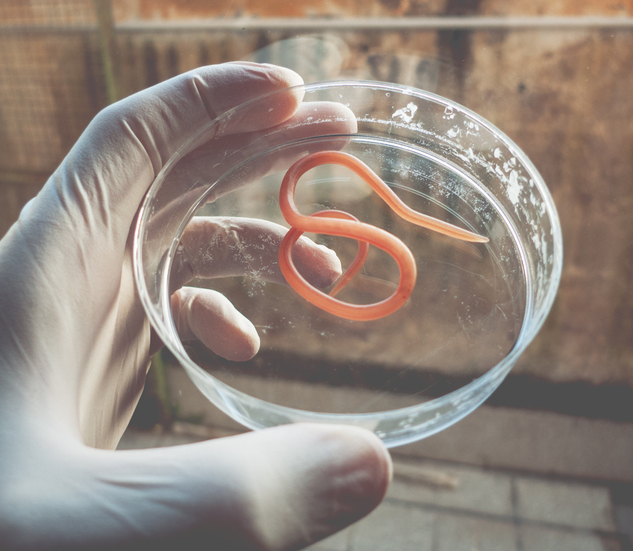Roundworms in Cats: What to Look for in Plymouth Meeting, PA
Roundworms are nasty parasites that must be prevented or eliminated, as they can cause health problems in cats. They develop eggs, which can be observed in the cat’s stool and become infectious.
Roundworms can be seriously detrimental to kittens and cause malnutrition and failure to grow. They may also cause a pot-bellied appearance in the cat. It is best to practice prevention with heartworm medication and by cleaning your cat’s litterboxes daily.
Roundworm is particularly threatening to kittens, older cats, or cats with diminished immune systems. If you want to discover more about roundworms in cats and what to look for, this article can help.
What is Roundworm in Cats?
Roundworms are large-bodied worms with a range of about 3 to 6 inches in length. They are large-bodied, cylindrical, and have a white or light brown color. Roundworms do not connect to the digestive tract and swim freely within the intestine. They steal nutrients from the cat. There are two variations of roundworms that can infect your feline:
- Toxocara cati – The most widespread type of roundworm that often occurs in kittens. Their larvae can be consumed through the milk of the mother cat. When the eggs are processed in the digestive tract, the eggs come out as larvae.
- Toxocara Leonia – Less common and frequently found in mature cats. The eggs shed in the feces are digested and grow into adult ringworms in the bowels.
You can easily see roundworms with the naked eye. They have the appearance of cooked spaghetti. Roundworms are common in kittens, which causes a dangerous situation. Since the roundworms are stealing the kitten’s nutrients, it can cause them to stop growing. If left untreated, roundworm can have life-threatening consequences for kittens.

How Does Roundworm Infect Cats?
Roundworm eggs and larvae get into the cats’ tissues. Once they affect the lungs, they trigger irritation, and the cat coughs them up and ingests them again. When they return to the gastrointestinal tract, the larvae become adult roundworms and live in the intestines taking precious nutrients.
The roundworms develop eggs, which can be found in the feces. Once the eggs become infectious, they may stay that way for several years. Sometimes the larvae stay inactive in the liver. However, in a pregnant female cat, the larvae become active again, which can be secreted through the milk they give their kittens.
What Are the Symptoms of Roundworm?
Cats who have roundworm tend to develop very nasty symptoms. However, symptoms tend to be more prevalent in long-term, serious cases. Some of the possible signs of roundworm in cats or kittens:
- Coughing from larvae being present in the lungs
- Loose stool or severe diarrhea
- Poor or dull coat condition
- Pot-bellied appearance
- Stunted growth
- Inability to gain weight
- Worms that are present in feces or vomitus
The symptoms typically coincide with malnutrition due to roundworm infestation. For example, this results in an inability to gain weight in kittens and even poor coat condition. The worms are stealing all the nutrition, triggering weight loss and chronic hunger in older cats.
In rare instances, roundworm infections can cause a blockage of the intestines, which can render a cat to experience excessive vomiting and diarrhea.
What Causes Roundworms in Cats?
The leading cause of roundworms is when a mother cat passes larvae through their milk onto the kittens. The eggs may come from infected cats’ feces or a paratenic host’s tissues. In this type of host, the roundworm will not grow into an adult but is only carried by another organism. The roundworm can complete its lifecycle if the cat ingests the paratenic host.
Paratenic hosts for roundworms:
- Birds
- Cockroaches
- Earthworms
- Rodents
Cats may also contract roundworms by ingesting the eggs or larvae from grass or remnants of soil that carry infectious eggs. They may also get roundworm by grooming their fur or another cat’s fur, which contains eggs due to fecal or indirect contact.
How is Roundworm Diagnosed?
Diagnosis is often achieved with a fecal float test, which involves the cat’s fecal matter being blended with a mixture that triggers the eggs to float to the surface. The eggs are assembled on a glass slide and examined under a microscope.
Roundworm eggs are easy to spot with the use of a microscope. Having your cat checked for roundworms as part of their routine annual physical is essential, as many cats can have roundworms without demonstrating any signs.

What is Treatment for Roundworm in Cats?
Cats infected with roundworm are usually given a deworming medication by mouth, which promptly kills the worms. Dead worms may be present in your cat’s stool or vomit. However, medications will only kill adult roundworms, so medications must be repeated every two or three weeks during the time that the larvae are in the process of maturing.
The total of treatments given depends on the age of the cat and individual circumstances. Most cats recover well from roundworm contamination if the condition is treated effectively. Unfortunately, some kittens who are seriously infected may not survive.
How Can I Prevent Roundworm?
Kittens are generally infected at birth and should be provided with routine deworming treatments. They should receive medication every two weeks from age three to nine weeks and then at routine intervals afterward. Kittens can be dewormed before them receiving their first round of vaccinations.
Breeding females have to be dewormed before pregnancy and again during pregnancy. It decreases the threat of her getting worms or her kittens contracting worms from her. Adult cats are at risk during their lifespan. If it is discovered that the cat has roundworms, they should be dewormed immediately.
Outdoor cats are more prone to roundworms and should be checked twice a year. However, it is advisable to keep your cat indoors only to decrease the risk of them encountering roundworms. Many heartworm prophylactic products include medications that will remedy roundworm infections.
Proper administration of heartworm medication is the easiest way to prevent roundworms. You should talk to your veterinarian concerning the appropriate time to administer these products. Litterboxes should be cleaned daily or more often in multi-cat households.
Conclusion
Roundworm infection is a condition that commonly occurs in kittens, as it can be passed through the mother cat’s milk. If you think your kitten or cat may have roundworms, get them to the veterinarian as soon as possible.
For cat parents in the Plymouth Meeting, PA area, The Village Vets are available to serve you and your cat. Call us today at (484) 820-1700 or make an appointment!
Recent Posts
About The Village Vets
The Village Vets of Plymouth Meeting offers excellent service to clients in a comfortable, friendly atmosphere. To learn more about us and how we can better serve you and your pet here in Plymouth Meeting, PA, click the button below.
Share This Post
Recent Posts
About The Village Vets
The Village Vets is a network of three animal hospitals based in Atlanta, GA and the surrounding area. We offer honest, excellent service to our clients in a comfortable, friendly atmosphere. To learn more about our locations and how we can better serve you and your pet, click the button below.




